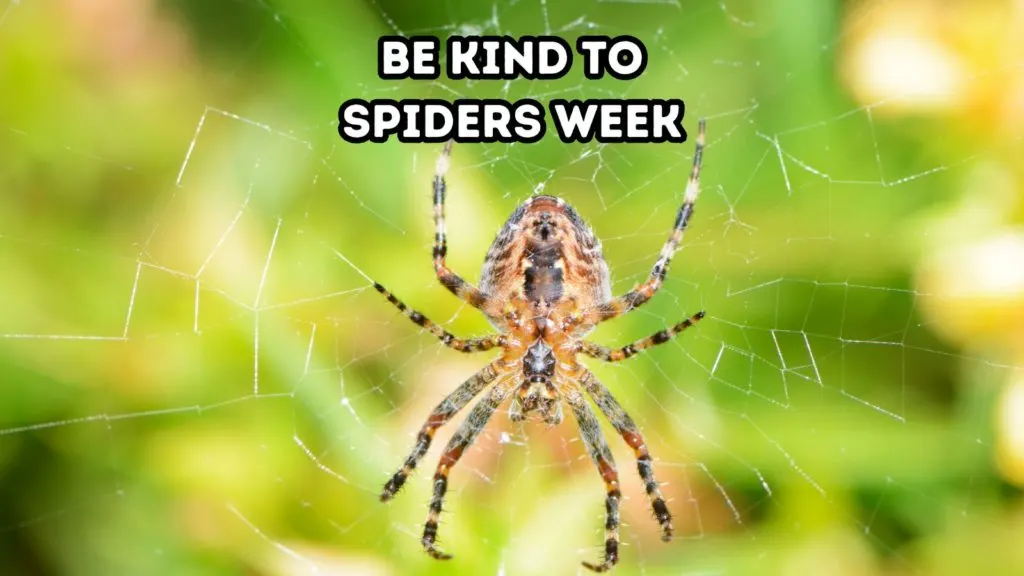Spiders, often perceived as mere creepy crawlies, play a pivotal role in our ecosystem, particularly in the lives of birds. Every year, Be Kind to Spiders Week is an opportunity to shed light on the symbiotic relationship between spiders and birds, especially those in our backyards.

When is Be Kind to Spiders Week?
Be Kind to Spiders Week is observed every year on the first full week of April.
The Diet Connection: Spiders as a Food Source for Birds
Spiders form a significant part of the diet for many bird species.
Birds like wrens, chickadees, and nuthatches often hunt for spiders among leaves and bark. The protein-rich spiders provide essential nutrients that help in the growth and reproductive success of these birds. This natural pest control ensures a healthy balance in our backyard ecosystems.
Spiders in Nest Building: A Unique Collaboration
The usefulness of spiders to birds extends beyond nutrition. Many bird species, including hummingbirds and finches, use spider silk as a binding material for constructing their nests.
This silk, known for its strength and elasticity, helps in stabilizing the nest, making it more secure for eggs and nestlings. This remarkable material also allows the nest to expand as the young birds grow.
Spiders as Indicators of a Healthy Environment
The presence of spiders in a backyard is often an indicator of a healthy, biodiverse environment. A rich spider population means there is enough food to sustain them, which in turn supports a diverse bird population.
Encouraging spider presence in backyards through natural gardening practices and avoiding pesticides benefits the overall health of the bird population.
Spiders play a critical role in managing insect populations. By preying on various insects, they help in controlling pests that could otherwise damage plants and gardens, which are vital food sources and habitats for birds.
This natural pest control reduces the need for chemical pesticides, which can be harmful to birds and other wildlife.
Fun Facts About Spiders
- A single spider can consume about 2,000 insects a year. That’s a lot of free insect control they’re providing us!
- Some spiders have developed unique camouflage techniques to avoid predation by birds. For instance, crab spiders can change color to blend in with their surroundings, making them less visible to birds.
- There are over 45,000 known species of spiders, found in habitats ranging from rainforests to urban gardens. This makes them one of the most diverse creatures on the planet.
- Spiders are famous for their silk, a protein fiber they produce from spinnerets at the end of their abdomen. Spider silk is incredibly strong and elastic, and its uses vary from creating webs for catching prey to making cocoons for their offspring.
- Spiders do not have a circulatory system like mammals. Instead, they have a hemolymphatic system, and their ‘blood’ (hemolymph) flows freely through their body cavity, moved by their heart pumping in a peristaltic manner.
- Some spiders engage in a behavior called ballooning, where they release silk to catch the wind, allowing them to travel long distances through the air, sometimes covering hundreds of miles.
- While most spiders have eight eyes, some species have six, four, two, or even no eyes! The arrangement and size of these eyes can vary greatly and are often used to identify different spider families.
- The lifespan of spiders varies widely among species. Some may live for only a few months, while others, like certain types of tarantulas, can live for over 20 years.
- Some spiders, like the water spider (‘Argyroneta aquatica’), can live entirely underwater. They create an air bubble web, which acts like a diving bell, allowing them to breathe underwater!
Fostering Appreciation and Coexistence
‘Be Kind to Spiders Week’ serves as a reminder of the crucial role spiders play in the lives of backyard birds and the wider ecosystem. By understanding and appreciating their contribution, we can foster a more harmonious coexistence with these often misunderstood creatures.
Encouraging spider-friendly habitats in our backyards can greatly benefit the avian community and enhance the natural balance of our local ecosystems.
More Nature Days You Might Enjoy
BirdTipper features dozens of bird days that recognize birds and the wildlife that impacts birds. You also might enjoy these observances:
International Hawk Migration Week
- Does Bird Seed Expire? - May 11, 2024
- How Big Are Baby Hummingbirds? - May 5, 2024
- How to Prevent Mold in Hummingbird Feeder - May 2, 2024
